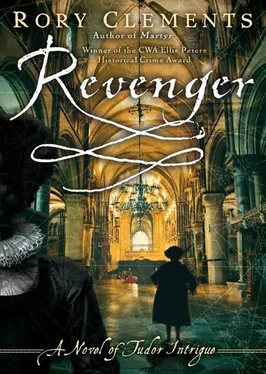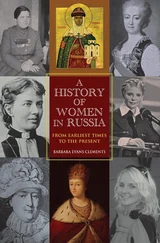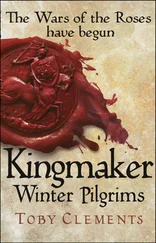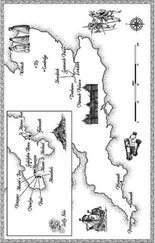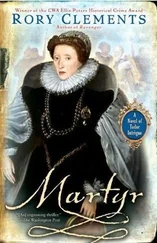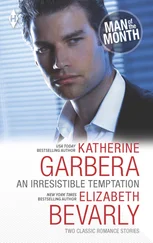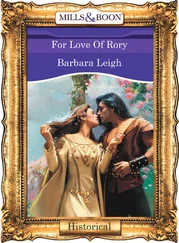“Yes, yes, of course.”
“You must say ‘I will,’ my lord…”
“I will. I will. Is that it? Are we married?”
“Almost, my lord, almost…”

I N THE TREES, unseen, John Shakespeare had watched the wedding party proceed toward the church. He knew the bride must come eventually and so he waited for her. At last she came with Penelope Rich and a man he did not know, appareled in scarlet velvet, a sword at his waist. His head moved this way and that, slowly, like an adder. Shakespeare found himself half expecting the man’s tongue to flick out and be forked. Some instinct told him the man was Morley.
The ivory bride dismounted. She moved her veil aside momentarily to look about her, and Shakespeare recognized the sad face he had seen at the window in Shrewsbury House, Chelsea. Her eyes were blue and a little too big; her mouth was too severe and her nose large. Now she smiled and her eyes darted. Yet even the smile did not suit her and nor did it disguise her loneliness and unease; she cut a poignant figure, here with these people who wanted everything from her, but nothing for her.
The men at the door helped her from her horse and then Penelope and the man in scarlet took her inside the church. As soon as they had gone in, Shakespeare entered the porch, hesitating at the door as long as he dared. From inside, he heard the words of the minister as the service got under way. He looked about him before turning the latch on the strong old oak door. As he pushed it, the iron hinges creaked loudly, then the iron edge of the door clanged as it swung inward against the stone wall.
Shakespeare stepped inside. Heads swiveled in his direction; eyes bore down upon him as if seeing some apparition. At first there was surprise and curiosity in their expressions, then a gathering rage. The vicar’s mouth hung agape, in mid-sentence.
“In the Queen’s name, I say this wedding cannot proceed,” Shakespeare bellowed in a voice of surprising power and confidence. He was unarmed, for what use would one poor sword or pistol be against twenty war-hardened men? He walked forward along the nave, between the ranks of Essex’s supporters, their fingers suddenly tightening on the hilts of their swords.
Penelope Rich rose from her seat and stepped forward to bar his path. “I am afraid you are too late, Mr. Shakespeare. The ceremony is completed. My brother and the lady Arbella now stand before you as man and wife.”
Shakespeare stopped. He did not believe it; there had not been sufficient time. He turned to the minister, who was quivering like an ash leaf in the breeze. “Is this true?”
Even through the haze of his muddled, befuddled, and panicking mind, Oswald Finningley knew he was caught up in something very bad; this man, whoever he was, had invoked the authority of the Queen herself. To talk to these nobles in such wise must, at the very least, make him a senior officer in her government. Though hopelessly outnumbered and at the mercy of these armed men, he understood that to stand with them might very well result in a traitor’s death, with everything that entailed. He shook his head.
“No,” he said, his voice no more than a whimper.
“They are not married?”
Finningley shook his head again.
“Then I say this wedding will not take place. It is forbidden under the law, not only because it is unlicensed by Her Majesty, but also because the bridegroom already has a wife.”
The gangling figure of Essex moved away from his bride toward the source of interruption. His handsome head was angled forward from his awkward, sloping shoulders. “ Had a wife, Shakespeare,” he said, spitting the words. “I am recently bereaved and am, sadly, a widower. She died of her madness. God’s blood, sir,” he shouted, “what is all this to you?”
Shakespeare suddenly realized what loathing he felt for this man who would sacrifice his wife, the mother of his child, to self-serving ambition. A man who would turn on the very monarch who had raised him to such great power and public esteem.
“My lord,” Shakespeare said coldly, “it is not long since I left Sudeley Castle, and I can tell you your wife was in perfect health, quite recovered from her sickness of mind and body. Your friend Slyguff does not fare so well. He floats in the River Isbourne, feeding the water voles and rats.” He turned to the bride and spoke sharply and with all the authority he could muster. “The lady Arbella Stuart will come with me now, back to the protection of her grandmother. This wedding has not been sanctioned and will not take place.”
Shakespeare brushed past Lady Rich, took two steps toward the chancel, knocked elbows with Essex, then reached out and grasped the arm of the young claimant to the throne. Arbella sobbed, but did not resist. He began to drag her away, back along the nave toward the porch.
Essex was thunderstruck, frozen in indecision. And then he acted. He strode toward one of his heavily armed band and seized a flail that hung loose from his belt. The weapon had a three-foot haft, then a short chain of four or five links, attached to which was a heavy metal ball with six spikes protruding like a bursting sun. As Shakespeare pulled the bride through the center of the church toward the door, he did not see Essex pursuing him like a man possessed, the haft of the flail clasped in both hands as if he would bring it down in a man-killing blow.
Shakespeare pushed on toward the open door, but then his exit was closed off. Half a dozen men-at-arms barred his way, among them Sir Toby Le Neve and the swordsman in scarlet velvet.
Le Neve put up the flat of his hand at Shakespeare’s chest. “Mr. Shakespeare, you have an unpleasant habit of appearing where you are not wanted. Now, hold fast. You will not leave this church.”
Shakespeare pushed the hand aside. “I take no orders from murderers.” He had lost all fear now. “This is Queen’s business, Le Neve. Move aside. I have enough on you to hang you twice over and will deal with you later.”
A three-pound ball of solid black iron, encrusted with short, deadly spikes, came down through the air toward Shakespeare’s head. He had no way to get clear of the blow. All he saw was the look in Le Neve’s eyes-a look of horror and dismay.
Le Neve flung him sideways to the stone-flagged floor of the church, and Shakespeare felt a whisper of pain as a spike of the flail skimmed his temple on its downward trajectory. Behind him, Arbella sprawled forward, tripping over her skirts and collapsing in a sobbing heap at the edge of the aisle.
It was Le Neve who took the blow. The dead weight of the ball and the malevolent spikes crushed through the bottom half of his face, destroying his chin and carrying on into his throat, where it dug through his windpipe, pummeling his Adam’s apple into a mush of gore and gristle. He crumpled at the knees and was thrown backwards to the ground, the spikes embedded in his upper body. Blood gurgled in the remains of his throat and spurted from his demolished mouth. His upper lip moved as though he were trying to say something, but no coherent sounds emanated from him.
Shakespeare should have scrabbled away, for out of the corner of his eye he could see the flail being raised again, but instead he rose to his knees and knelt beside Le Neve. He saw cloudy resignation in the warrior’s eyes, followed quickly by the opacity of death. Feeling a curious pang of sorrow, he was about to close the dead man’s eyes when he looked up to see Essex about to bring down the flail once more and knew that he, too, was about to die.
“Enough!”
Bess of Hardwick was not tall, scarce over five foot, and yet her voice boomed through the echoing chambers of the church like that of a sergeant-at-arms.
Читать дальше
